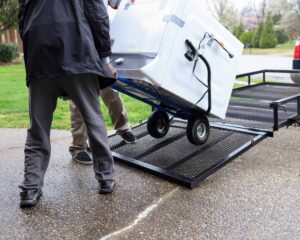What to Do with Broken Appliances? Your Guide to Appliance Disposal
Appliances play a crucial role in daily life, making household tasks more efficient. However, when they break down, figuring out what to do with them can be challenging. Many people leave broken appliances in storage, hoping to fix them someday, while others simply discard them without considering their impact on the environment. Understanding how to dispose of broken appliances responsibly can help reduce waste, promote recycling, and even save money.
Assessing the Condition of the Appliance
Before deciding on disposal, it is important to determine whether the appliance can be repaired or repurposed. Sometimes, minor issues such as a faulty fuse, worn-out wiring, or a malfunctioning motor can be fixed at a lower cost than purchasing a new one. Checking the manufacturer’s warranty can also help, as some companies offer free repairs or replacement parts within a certain period. If repairing the appliance is an option, seeking the assistance of a professional technician may extend its lifespan.
If the appliance is beyond repair or the cost of fixing it exceeds the price of a new one, disposal becomes the next logical step. However, throwing it in the trash is not the best solution. Many appliances contain hazardous materials such as refrigerants, heavy metals, and electronic components that can be harmful to the environment. Finding an appropriate disposal method is essential.
Recycling and Donation Options
 One of the best ways to handle a broken appliance is to recycle it. Many recycling centers accept old appliances and break them down into reusable materials. Metals, plastics, and glass components can be repurposed for other uses, reducing the need for new raw materials and minimizing landfill waste. Some municipalities offer curbside pickup for large appliances, while others require drop-offs at designated facilities.
One of the best ways to handle a broken appliance is to recycle it. Many recycling centers accept old appliances and break them down into reusable materials. Metals, plastics, and glass components can be repurposed for other uses, reducing the need for new raw materials and minimizing landfill waste. Some municipalities offer curbside pickup for large appliances, while others require drop-offs at designated facilities.
If the appliance is still functional but no longer needed, donating it can be a great option. Charities, shelters, and community centers often accept used appliances to help families in need. Some organizations even offer pickup services, making it convenient to give away an old appliance. Selling it online or offering it to someone in the community can also be a practical way to ensure it gets a second life.
Safe Disposal Methods for Large and Small Appliances
Different types of appliances require different disposal methods. Large appliances such as refrigerators, washing machines, and ovens often contain components that require special handling. Many retailers have trade-in programs where customers can return old appliances when purchasing new ones. Some manufacturers also provide take-back programs, ensuring that outdated appliances are disposed of responsibly.
For smaller appliances like microwaves, toasters, and coffee makers, electronic waste recycling programs can be a good solution. Many electronics stores have designated drop-off locations for small appliances and other electronic devices. Disposing of these items through proper channels prevents harmful substances from ending up in landfills.
Upcycling and Creative Repurposing
Instead of throwing out a broken appliance, upcycling it into something useful can be a fun and creative alternative. Old washing machine drums can be turned into fire pits, refrigerators can be repurposed as storage cabinets, and broken microwaves can be dismantled for parts that may be useful for other DIY projects. Repurposing appliances not only reduces waste but also adds a unique touch to home décor and functionality.
Some individuals take broken appliances and turn them into works of art or functional furniture pieces. Repurposing materials from an old appliance into something new can be a rewarding project while also contributing to environmental sustainability.
Contacting Professional Disposal Services
If recycling or repurposing is not an option, professional disposal services can handle the process safely. Many waste management companies offer appliance disposal services that ensure proper handling of hazardous components. Some charge a fee, while others provide free removal depending on the appliance and location. Researching local services can help find the most cost-effective and eco-friendly solution.
Certain utility companies also run appliance recycling programs that provide incentives for proper disposal. In some cases, rebates or discounts are offered for recycling old, energy-inefficient appliances when replacing them with energy-efficient models. Checking with local utility providers can help determine if such programs are available.